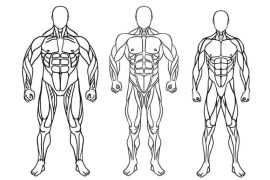Strength training, or lifting weights, offers a multitude of benefits that extend beyond simply building muscle. Firstly, it enhances muscle mass and strength, leading to improved physical performance in daily activities and sports. Additionally, strength training increases bone density, reducing the risk of osteoporosis and fractures, especially as we age. It also promotes fat loss by boosting metabolism, making it an effective strategy for weight management.
Moreover, strength training improves joint health, flexibility, and posture, reducing the risk of injury and alleviating chronic pain. Furthermore, it can enhance mood and mental well-being by releasing endorphins, reducing stress, anxiety, and symptoms of depression. Overall, incorporating strength training into your fitness routine offers a wide range of physical and mental health benefits, making it an essential component of a well-rounded exercise program.
Benefits of strength training:
- Muscle Growth and Strength: Strength training stimulates muscle growth by causing microscopic damage to muscle fibers, which then repair and grow stronger during rest periods. This leads to increased muscle mass and strength over time.
- Boosts Metabolism: Building muscle through strength training increases resting metabolic rate, meaning the body burns more calories at rest. This can aid in weight management and fat loss efforts by promoting calorie expenditure even outside of exercise sessions.
- Enhances Bone Health: Strength training helps increase bone density and reduces the risk of osteoporosis, particularly important for women and older adults. Weight-bearing exercises stimulate bone growth and strengthen bones, improving overall bone health and reducing the risk of fractures.
- Improves Functional Strength: Strength training improves functional strength, which is essential for performing daily activities such as lifting, bending, and carrying. This enhances overall physical performance and reduces the risk of injury during everyday tasks.
- Enhances Joint Health: Strengthening the muscles around joints provides better support and stability, reducing the risk of injuries and improving joint function. This is especially beneficial for individuals with arthritis or other joint-related conditions.
- Promotes Better Posture: Strength training exercises targeting the core, back, and shoulders help improve posture by strengthening muscles that support the spine and maintain proper alignment. This can alleviate back pain and reduce the risk of postural issues.
- Increases Energy Levels: Regular strength training increases energy levels and reduces feelings of fatigue by improving overall physical fitness and endurance. This can lead to increased productivity and improved quality of life.
- Enhances Mental Health: Strength training has been shown to have positive effects on mental health by reducing symptoms of anxiety, depression, and stress. It promotes the release of endorphins, neurotransmitters that improve mood and reduce feelings of pain and stress.
- Reduces Risk of Chronic Diseases: Strength training helps manage and prevent chronic diseases such as diabetes, heart disease, and hypertension by improving cardiovascular health, insulin sensitivity, and overall fitness levels.
- Boosts Confidence and Self-esteem: Progressing in strength training and achieving fitness goals can boost confidence and self-esteem. The sense of accomplishment from lifting heavier weights or achieving new personal records contributes to a positive self-image.
In summary, strength training is important for building muscle, improving metabolic health, enhancing bone density, reducing the risk of injuries, and promoting overall physical and mental well-being. Integrating strength training into a balanced exercise routine can lead to numerous health benefits and improve quality of life.
Disclaimer:
The information contained in this article is for educational and informational purposes only and is not intended as a health advice. We would ask you to consult a qualified professional or medical expert to gain additional knowledge before you choose to consume any product or perform any exercise.







